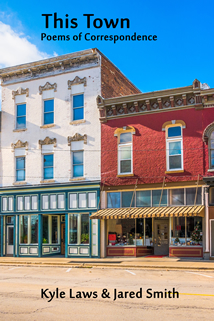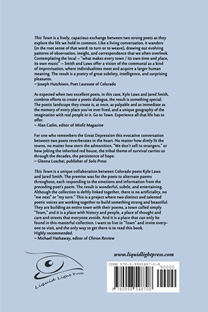
from Kyle Laws
& Jared Smith
| books | home | poets |submit | donate | contact | events | about
This TownBy Kyle Laws & Jared SmithThis gritty collaboration on small town America between two of Colorado's finest poets will hit you where you live. Now available in our Lulu Bookstore as a Premium First Edition Chapbook or as an ebook in PDF or ePub formats. It is also available for Kindle Readers directly from our Kindle Book Shelf.
|
|
|
What others are saying about This Town:This Town is a lively, capacious exchange between two strong poets as they explore the life we hold in common. Like a living conversation, it wanders (in the root sense of that word: to turn or to weave), drawing out evolving patterns of observation, insight, and correspondence that we often overlook. Contemplating the local – "what makes every town / its own time and place, its own music" – Smith and Laws offer a vision of the communal as a kind of improvisation, where individualities meet and acquire a larger human meaning. The result is a poetry of great subtlety, intelligence, and surprising pleasures. As expected when two excellent poets, in this case, Kyle Laws and Jared Smith, combine efforts to create a poetic dialogue, the result is something special. The poetic landscape they create is, at once, as palpable and as immediate as the memory of every place you’ve ever lived, and a unique geography of the imagination with real people in it. Go to Town. Experience all that life has to offer. For one who remembers the Great Depression this evocative conversation
between two poets reverberates in the heart. No matter how dimly lit the towns, no matter how stern the admonition, "We don't sell to strangers," or how jolting the inherited red house, the tribal theme of survival carries us through the decades, the persistence of hope. This Town is a unique collaboration between Colorado poets Kyle Laws and Jared Smith. The premise was for the poets to alternate poems throughout, each responding to the emotions and information from the preceding poet's poem. The result is wonderful, subtle, and entertaining. Although the collection is deftly linked together, there is no artificiality, no "me next" or "my turn." This is a project where two distinct and talented poetic voices are working together to build something strong and beautiful. They are building an entire town with their poems, a town called simply "Town," and it is a place with history and people, a place of thought and care and streets that everyone avoids. And it is a place that can only be found in this masterful collection. I want to live in "Town" and invite everyone to visit, and the only way to get there is to read this book. From the amazing, Los Angeles Review's article called, "Toward Paradox: The Wisdom of Jared Smith" by John Amens (April 2017): Smith’s latest release, This Town: Poems of Correspondence (Liquid Light Press, 2017), includes poems by Smith and Kyle Laws, editor and publisher of Casa de Cinco Hermanas Press. Rather than a collaborative work, per se, the poems operate as a dialogue between two poets; each piece furthers a thematic discussion and poetic exploration re “place.” The book opens with Smith’s “How Do You Look at this Space?”Growing older I write colder in fire,
Smith reflects upon the process of “growing older,” his voice faintly reminiscent of John of the Cross: the poem a psychic offering, a sacrifice of certitude, “words” serving as a gateway into “eternal life.” In this way, the book opens with a broad invocation: place as fixed locale and indeterminate (alchemical) process. Smith accentuates not only the ephemerality of identity but also the transience of knowledge. Knowing is temporary and dependent on context. Smith is Progressive not only in the socio-aesthetic sense, as discussed above, but also spiritually, with each understanding leading to a subsequent understanding and so forth. The quester is engaged in an organic and perhaps endless process of shedding relativistic illusions, which may eventually offer what might be regarded as wisdom. The collection’s intriguing title poem is by Laws. She opens: “This town lives in a snapshot from a box camera.” Immediately the reader encounters the piece as narrative in real-time and a meta-study. In addition, because a title poem tends to prompt interpretative implications for the entire collection in which it appears, this poem serves much as a metonymic template, both stabilizing and destabilizing the book, thematically and linguistically. The poem continues: “Its name is Town. But who lives in a town called Town?” Laws offers a humorous take on the impenetrability of metaphor, prompting a reader to recall Stevens’s sympathetic “The Motive for Metaphor.” The second stanza introduces “A woman in a red house….” The speaker offers, “No one paints a house red.” The poem ends: “There is confidence in a woman who would live / in a red house. A confidence you want for yourself. / A Language you want to learn to speak.” Laws segues from the almost absurdist depiction of the red house to the more haunting image of the seemingly solitary woman who lives in the house “on a bluff over the sea.” The reader is immediately curious about the woman, who is both sirenic and ethereally asexual, an archetypal reference to western mythology as well as a primitivistic stick figure disconnected from any recognizable matrix. As the narrator suggests, a desire (probably unappeasable) rises to understand the scene, this “confidence,” this “language.” Laws succeeds at offering a playful commentary on language and, like Smith, synonymizes place with Mystery. Place is presented, again, as process. Place is further explored: historically/narratively (Laws, “The Depression in Town”), mythically (Smith, “That Night in ’41”), through distinct portraiture (Smith, “The Owner of Windows”), through confessional/first-person persona (Laws, “Demanding for a Dancer to Keep in Shape in Town”), through short-form reminiscent of imagistic haiku (Laws, “A Dove in Town”), and through the obliquely eulogistic (Smith, “Windows”). The book concludes with Laws’s “Dancing in Atlantic City,” which reads much like an ekphrastic response to an Edward Hopper painting, and the voice of which would certainly be celebrated by Williams as resonantly American: The dancers’ hotel down the street from Steel Pier Smith’s “correspondence” with Kyle Laws is a significant addition to his oeuvre. While both poets draw narratives and imagery from the collective American story, celebrating resiliency while lamenting a world burdened by the pitfalls of capitalism, dissociation, and apathy, their differences serve to highlight their distinct approaches: Laws, to use a photographic analogy, often magnifies the micro as an origin point, prompting the reader to interpretively pan toward the macro. Smith, on the other hand, frequently works with wide lens, enrolling the reader with thematic and imagistic panoramas, before zooming in on key particulars. In either case, internal and external merge, as do micro and macro, each becoming a mirror and metaphor for the other.
|
||
Kyle Laws & Jared Smith reading from their chapbook,
|
||

